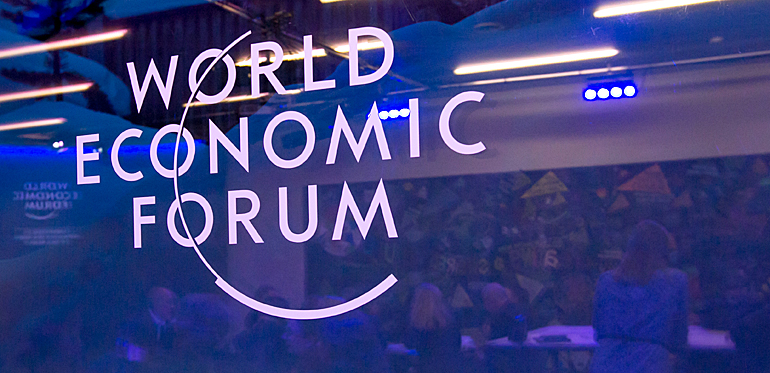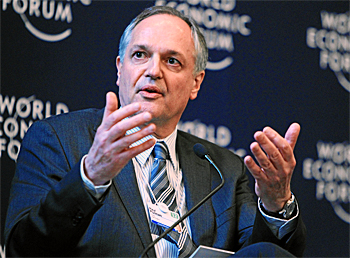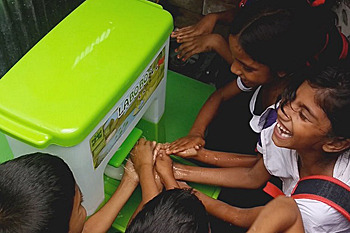World Economic Forum Davos: ‘SDG 6 is key part of growth strategy for smart businesses’
 ‘Smart businesses will recognise that Sustainable Development Goal 6 on water needs to be a key part of their growth strategy’, commented Paul Polman, Chief Executive Officer, Unilever in support of the activities of the Toilet Board Coalition at the World Economic Forum in Davos, Switzerland.
‘Smart businesses will recognise that Sustainable Development Goal 6 on water needs to be a key part of their growth strategy’, commented Paul Polman, Chief Executive Officer, Unilever in support of the activities of the Toilet Board Coalition at the World Economic Forum in Davos, Switzerland.
At the Global Forum the Toilet Board Coalition highlighted the ‘Sanitation Economy’ and its immense business opportunities of providing universal access to safe sanitation.
On the occasion, Unilever announced to quadruple its contribution to the Transform programme to 40 million UK pounds in support of social enterprises.
 CEO Paul Polman at Unilever underpined the business opportunities of sanitation.
CEO Paul Polman at Unilever underpined the business opportunities of sanitation.
Helping low-income consumers
The Transform programme is founded by UK’s Department for International Development (DFID) and Unilever in 2015 to support market-based solutions that meet low-income household needs in developing countries.
Through financial and business support for social enterprises and behaviour-change interventions, the programme’s aim is to enable 100 million people in sub-Saharan Africa and Asia to gain access to products and services that have been shown to improve health, livelihoods, the environment or wellbeing by 2025.
To date, it has supported 19 projects across nine countries, including a mobile platform for shopkeepers in Kenya that encourages them to become change agents in their communities, and a portable handwashing station for low-income households in Bangladesh.
Huge economic potential
At the World Economic Forum the Toilet Board Coalition draw the support of several CEO’s to join its agenda on ‘sanitation economy’ that, according to the coalition, has an estimated 62 billion US dollar opportunity by 2021 in India alone.
Sanitation has many business opportunities such as innovative toilet design, recovery of biological resources (biogas and fertilizer), and smart digital technologies driving preventative healthcare.
 Clean water, clean toilets and soap are important elements of preventive health care.
Clean water, clean toilets and soap are important elements of preventive health care.
Three sub-economies
According to the Toilet Board Coalition the ‘sanitation economy’ has three distinct elements:
● The Toilet Economy — innovation within toilet products and services that ensures toilets are designed fit for purpose for all environments and incomes
● The Circular Sanitation Economy — toilet resources (commonly known as human waste) feed into a circular economy system which replaces traditional waste management
● The Smart Sanitation Economy — digitised sanitation systems that optimise data for operating efficiencies, maintenance, plus consumer use and health information insights
On 25 January in Davos, the Toilet Board Coalition hosted a roundtable discussion with respected global leaders, including CEO’s of Unilever, LIXIL Corporation, Kimberly-Clark, TATA Trusts and Firmenich, to discuss an Action Agenda for the Sanitation Economy.
This news item is based on originally publications on the websites of Unilever, The Toilet Board Coalition and Transform.
Read also on this website
● Philips, Arcadis, Rabobank and DSM join WBCSD Factor10 initiative on circular economy in Davos, 23 January 2018
● AIWW 2017: Sarphati Sanitation Award winners urge financers to boost sanitation services, 6 November 2017
● Safi Sana installs new digester to expand its waste conversion capacity in Accra, Ghana, 7 February 2017
● Expertise: Water for all
More information
Unilever
Rotterdam, the Netherlands
+31 10 217 40 00
www.unilever.com
Toilet Board Coalition
www.toiletboard.org



